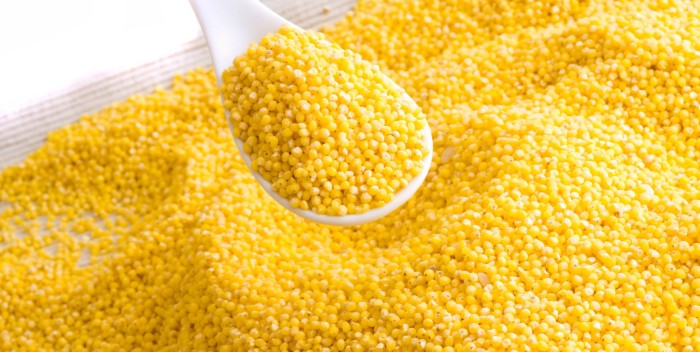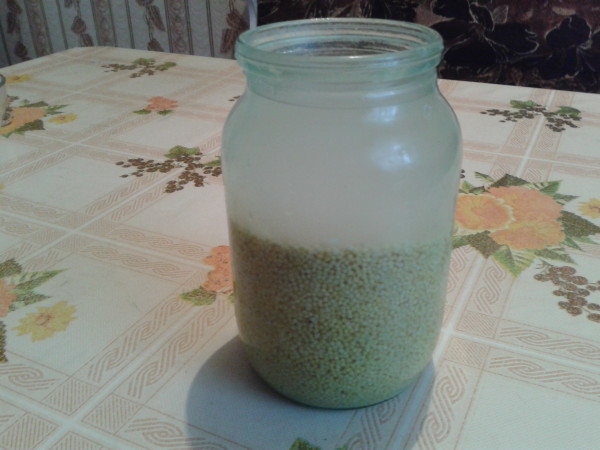Millet: benefits, harm, contraindications
From the grains of millet, a golden cereal called millet is obtained. Millet is very useful and nutritious, it is often recommended by experts as one of the cereals suitable for dietary nutrition. Millet has many beneficial properties that have been known for more than one century and are used in cooking, as well as for medicinal purposes.
The benefits of millet
This golden cereal contains a whole storehouse of vitamins, healthy fats, proteins and amino acids. The latter are especially important for normal muscle function and good skin condition. The vegetable fats contained in millet are essential for the high-quality assimilation of certain vitamins, such as vitamin D and carotene. Millet helps the body get rid of toxins and toxins. It is very useful to eat millet dishes for patients with liver diseases and gastrointestinal disorders.
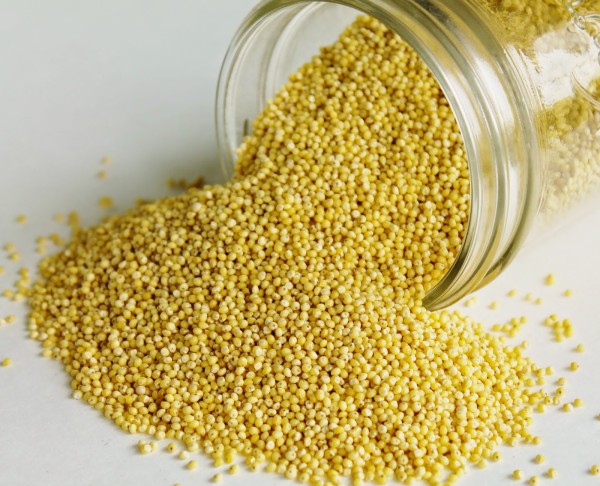 The low calorie content of ready-made porridge makes it indispensable for dietary nutrition. People trying maintain ideal weight, appreciate millet porridge for its ability to remove fats from the body, due to its high lipid content.
The low calorie content of ready-made porridge makes it indispensable for dietary nutrition. People trying maintain ideal weight, appreciate millet porridge for its ability to remove fats from the body, due to its high lipid content.
Millet contains a lot of protein. In terms of its quantity and quality, millet is comparable to wheat groats and surpasses barley and rice. It also contains a lot of fats; in terms of their quantity, millet is in second place, yielding to the first oatmeal. Millet contains almost a complete set vitamins group B, folic acid and many minerals.
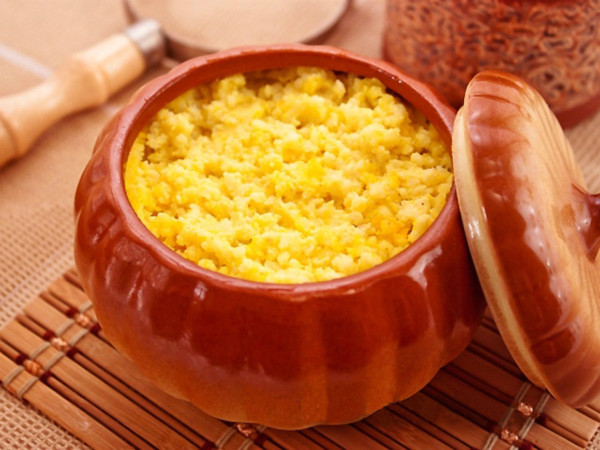 It is very useful to eat millet dishes for residents of large cities. After all, the substances that make up this cereal perfectly cleanse the body of toxins, toxins and other nasty things. Millet even copes with heavy metal ions and medical antibiotics. Although the latest information has not yet been confirmed by scientific research.
It is very useful to eat millet dishes for residents of large cities. After all, the substances that make up this cereal perfectly cleanse the body of toxins, toxins and other nasty things. Millet even copes with heavy metal ions and medical antibiotics. Although the latest information has not yet been confirmed by scientific research.
Millet harm
Like any other product, millet also has bad sides. It has a beneficial effect on the intestines with frequent indigestion. But this means that millet porridge is not recommended for a person with persistent constipation. Loose porridge tends to irritate the inner walls of the stomach and intestines. Therefore, in case of stomach problems, it is better to cook liquid millet porridge.
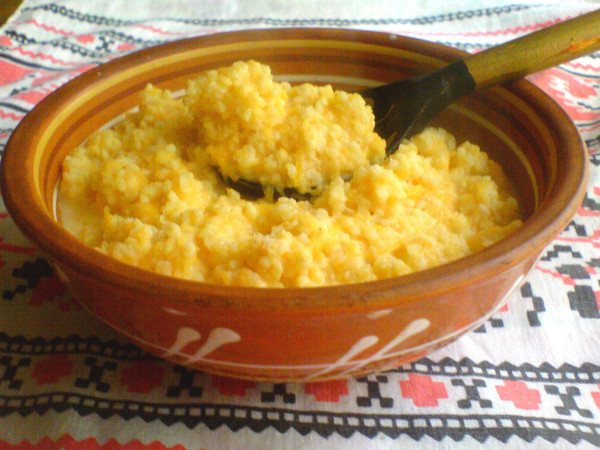 Millet has a high content of polysaccharides, because of this, it puts a lot of stress on the pancreas. Millet reduces the rate of iodine absorption. Some experts point out that it has a bad effect on the potency of men.
Millet has a high content of polysaccharides, because of this, it puts a lot of stress on the pancreas. Millet reduces the rate of iodine absorption. Some experts point out that it has a bad effect on the potency of men.
Millet contraindications
Although this product has a lot of wonderful and useful qualities, some people should still limit the use of millet porridge.
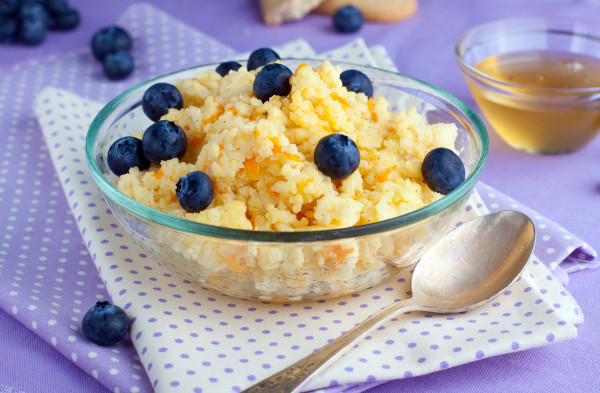 These contraindications include:
These contraindications include:
- Sometimes a person is allergic to millet - indigestion and allergic rashes occur.
- Since millet has a bad effect on the absorption of iodine, it is not recommended for people with endocrine diseases, children and pregnant women.
- You should not get carried away with millet porridge and men who have problems with potency.
- For diseases such as hypothyroidism, inflammatory processes in the large intestine, chronic constipation, low acidity of the stomach, millet is also contraindicated.
- With some restrictions, millet porridge can be consumed with pregnancy.
Millet treatment
Millet is very often used in folk recipes for treatment. Here are some very popular millet treatments:
- To get rid of cystitis, it is useful to drink millet infusion. To do this, pour the cereal with boiled water and let it brew. Then strain and drink. Millet and water must be taken in the same quantity. You can pour the cereal several times until the taste of the drink changes. After that, discard the old cereal and take a new portion.
- With kidney diseases, this recipe helps - rinse a glass of millet groats with water and pour boiling water (2 liters). Then boil the millet for 5 minutes and turn off the heat. Leave to sit until the water cools, strain and drink throughout the day.
- For the treatment of diseases of the bladder, take note of this method - prepare a decoction of 3 tablespoons of millet and 750 ml of water, strain. On the first day, drink one large spoonful of the broth every hour. The next day, increase this serving to three scoops. Then, until the seventh day, you should drink a third of a glass of millet broth three times a day.
- Millet porridge will help with heart disease. Before cooking, heat some cereals in a dry frying pan. Then fill it with water (take 2 times more water) and cook the porridge. Eat it twice a day.
- Millet porridge can be used to heal wounds and pressure sores. Place the cool mass in a clean cloth and apply to the affected area. The wounds will soon begin to heal.
- For bouts of inflammation of the pancreas, use this treatment - pour a couple of glasses of cereal with 4 liters of water and cook until completely boiled. Then grate two cups of pumpkin and add it to the saucepan. Cook for another 20 minutes. Season the finished dish with salt and olive oil. Eat this porridge for two weeks instead of dinner. After finishing the course of treatment, wait two weeks and repeat the therapy again.
- To stabilize blood sugar, eat two tablespoons of millet, ground into fine flour, three times a month.
